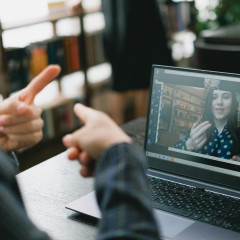Can you firstly tell us a little bit about yourself?
I've been teaching computer studies and science, and working for the Teachers Service Commission, Kenya for about eight years. I also work part-time as is an ICT Master Trainer, and am an ICT champion in charge of high school ICT integration in South Gucha sub county-Kisii County, under the auspices of the Ministry of Education and Technology.
I have written and presented two papers namely: "Case for ICT, Computer Science and Chess in the Early Childhood Education: Redesigning the Kenyan Curriculum",
and "A Case for ICT, Computing and Chess in Early Childhood Education." I'm now collaborating on a new paper: "Playing with the King: Introducing Primary Students to Computational Thinking with a Giant Chess Board".
I passionately volunteer and work with various communities and organizations who are engaged with Ed Tech initiatives to get women and marginalized children in Kenya basic digital literacy and coding skills and knowledge. I also champion Chess Kenya, in integrating chess efforts to the grassroots.
How did you first hear about Mozilla?
I first heard of them after using their Firefox web browser in 2006 and then I started interacting with the Mozilla educator community, after engaging with a tweet. I am also an advocate of open source and a defender of free internet access to all global citizens.
This is your first time coming to Mozilla Festival. What made you decide to attend?
Yes! As a matter of fact, MozFest is a world-famous event in particular for the open source community. I was fortunate to be selected as a space contributor in the arts and culture section and a facilitator in the youth zone.
It's a place where techies, educators and open internet advocates meet to discuss past, present and future emerging technologies and innovations. I am a global citizen; ready to mingle and connect, communicate, share and collaborate with fellow global citizens - especially the talented, creative and innovative Mozilla community.
What do you hope to get out of the weekend?
I hope to learn about new Mozilla products and services, and meet different distinguished speakers on various categories and fields. I also want to connect, communicate and share with the global Mozilla community, and volunteer and facilitate with other Mozillians.
What is your earliest technology memory?
My first digital literacy lessons and programming experiences were in 2001, while at college. These topics were new to me! And the tutor overseeing the tutelage could not fully de-mystify the contents and concepts for me and the rest of the students! But I feel a bit nostalgic now, for the way the classes helped me get a rich experience in the world of edtech, despite the challenges faced at the beginning.
Why is it that you use chess in your projects to help teach coding?
What attracts me mostly stems from this facts: kids love games, and game-based instruction helps them get concepts easily, it also demonstrates a good use of logic and strategy - skills which are also paramount in our educational systems. A good example is the application of mathematics.
Chess encourages perseverance, focusing, visualizing, thinking ahead, weighing options, analysing concretely, thinking abstractly, planning, juggling multiple considerations simultaneously. None of these skills are specific to chess, but they are all part of the game. The beauty of chess as a teaching tool is that it stimulates children's minds and helps them to build these skills while enjoying themselves. As a result, children become more critical thinkers, better problem solvers and more independent decision makers.
Chess is also part of the curricula in nearly 30 countries. In Venezuela, Iceland, Russia and other countries, chess is a subject in all public schools.
As a part-time worker for the Kenyan Government, what projects are you excited to see them embrace?
Apart from the 1-to-1 BYOD deployment, which the current government is embracing, and increasing ICT infrastructure in all social-economic lives, having affordable internet connectivity and broadband, the project I'm most excited to see is the Government teaching responsible digital citizenship through education and learning digital literacy.
My wish is that the government fully embraces the open source initiatives, even to an extent of adopting it entirely, encouraging adoption of Open Educational Resources OERs to our educational community.
As a Mozillian and an edtech educator in Kenya, I will use my role as an active volunteer to inform people in Kenya of the importance of embracing open source, teaching web literacy and starting up Mozilla Clubs countrywide. We really need an edtech revolution and it has to start with our local community.
What more can be done to encourage communities to embrace technology?
First and foremost, improving the ICT infrastructure, landscape, easier access of the internet connectivity and lowering the cost of broadband. We need multiple public-private sponsored digital villages in at least every district in the country installed with at least all basic ICT laboratory requirements to be accessible to the public for free or at a subsidized cost. With such scenarios emerging, the various clubs and societies will be the talk of the town!
We also need more edtech educators, tech specialist and volunteers to help disseminate the digital literacy skills to the grassroots.
How has technology changed the community? How do you see it further improving it?
Education has been greatly influenced and advanced by the BYODs and other innovations - students and teachers are becoming global digital citizens without them leaving their classrooms. Teleconferencing is also very cost effective.
Another good example from Kenya is a mobile money transfer service known as M-Pesa, which has revolutionised how the majority of the populace who didn't have a bank can use the digital tool to buy products and access various services.
Other innovations include M-Kopa, a solar powered device where users pay a token less than 1USD per day to access power. There are also things like Ushahidi, which is a crowdsourcing platform, and the emergence of iHub as a premier tech hub in Kenya.
This all shows the power of mobile phones, they have helped achieve major feats which were never imagined before.
With the internet now being declared as a basic human right by the United Nations, but with about 70% of the world populace not connected to the internet, we are seeing shifting paradigms in trying to connect them to the web via Wi-Fi technologies.
New shifts in quantum computing, artificial intelligence and robotics, virtual reality, Internet of Things, big data and machine learning are going to further revolutionize and change how humans will be interacting and existing with the technologies.
The non-profit organizations, like Mozilla, with collaborators and contributors from all over the world, can act as a catalyst to increase participation for the best of humanity.
Are there any downsides to continual integration of technology in society?
Despite the immense success stories, there are some challenges. The cost of ICT related products and services is a big issue. Raising a good citizen in a digital world that is awash with online abuse and cyber crimes is also problematic. There is also the issue surrounding citizens reluctantly refusing to adopt new technologies, with reasons ranging from religious to social-cultural and economic considerations.
Sharing of content is also an issue in social media. There is insufficient digital literacy and citizenship tutelage and skills in the general populace.
What upcoming technological advancements has you most excited?
The advent of quantum computing, virtual reality, the Internet of Things, artificial intelligence and robotics, data science, big data and machine learning are some of the upcoming technological feats which keep me excited and challenged at the same time. Take the example of the driverless car, which will help reduce human road errors.
What advice would you give to young people who want to enter the industry?
The best advice is to be ready to embrace the 21st century through learning, communication, creating, innovation, collaboration, sharing and entrepreneurship as well as through immersing themselves in projects, and activities which can help impact such skills.
They should also be industrious, embrace open-source, and join vibrant edtech communities like the Mozilla Community, and participate in activities like using the appropriate tools provided in the platform for learning web literacy, remixing projects and coding skills. They also need to keep abreast with the current and emerging technologies and advances.
For the person trying to do everything alone, the game really is over. If you want to do something big, you must link up with others. One is too small a number to achieve greatness-thus the law of significance.
-Chuck Swindoll.










Awesome article from legendary Tom Inniss!!